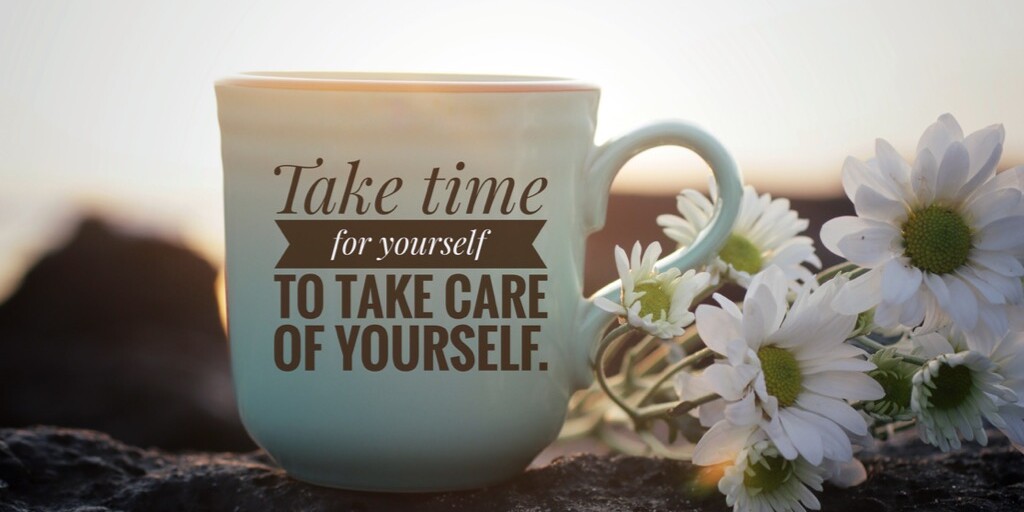
Self-Care for the New Year
By Rebecca Hume | Thursday, January 6, 2022
When psychotherapist and disability advocate, Lauren Presutti, needs to recenter with a little self-care, she focuses on taking the time to tune into her feelings. Lauren, who lives with congenital muscular dystrophy (CMD), is an expert in the mental health field and recognizes the value of self-care.
“Remember to acknowledge and express your feelings, whatever they may be. It can be helpful to journal about your experiences or talk with others about how you’re feeling. It’s OK to struggle; be gentle with yourself!” she says. (Read more about Lauren “Mental Health Is for Everyone.” [Quest Issue 4, 2021])
Self-care is an imperative, and often overlooked, aspect of overall wellness. Our constant exposure to stressors has a direct impact on our physical, mental, and emotional wellness. Practicing self-care is a crucial aspect of health maintenance and stress management. In fact, identifying and implementing methods of self-care can combat the negative impact of stress while increasing general well-being and happiness.
We’ve all heard the saying that you can’t pour from an empty cup. In order to successfully meet all of your personal and professional responsibilities (including providing care to others), you must also take the time to take care of yourself.
Self-care looks different to everyone. For some, it can be as simple as taking a break from work, going for a walk, and getting some fresh air. Mark Fisher, Director of Advocacy Engagement at MDA, opts to take a stroll around his neighborhood when the day gets too stressful.
With a focus on the new year, we gathered some self-care tips from some of our MDA staff, partners, and members of the neuromuscular community to share with you.
“Dedicate 15 minutes of time with no screens or distractions when you wake up and 15 minutes before you go to sleep. I always find this time great for setting intentions and focusing your thoughts for the day and at night, giving your mind time to reflect and reset.”
- Tiffany Meehan, VP Marketing at Inclusively, a wheelchair user, living with Spina bifida. Learn more about Inclusively in “Talent For Hire.” [Quest Podcast Episode 6, 2021]
“Spending time outside rejuvenates my mood. Even a 15-minute stroll around the neighborhood is enjoyable — if I focus on the trees, sky, and blooming plants. I frequently snap pictures of what I see and use the images as a reference when I paint.”
- Barbara Twardowski, a freelance writer and Quest contributor, lives with Charcot-Marie-Tooth disease (CMT) in Louisiana. Read Barbara’s article “Coping Through a Crisis.”
“More often than not, the best thing we can do for ourselves is think about ourselves less. Get out of our own head and do something productive. Start a project. Create something. Help out a friend or family member. Take a moment to appreciate the little things in life, and try to put some good into the world.”
- Bill Crossland, a filmmaker, lives with an unknown type of muscular dystrophy in Pennsylvania. Read about Bill in “Embrace Your Body” [Quest Issue 4, 2021 online exclusive]
“Do things that make you happy and take your mind off things for a while. I love watching TV — that honestly keeps me sane. I also suggest talking to a therapist if needed because, trust me, it helps. Connecting with others who can relate to you in support groups is a plus.”
- Keisha Greaves, an adaptive clothing designer and MDA National Ambassador, lives with limb-girdle muscular dystrophy (LGMD) in Massachusetts. Follow Keisha’s ambassador journey on the Quest blog.
“I pace myself throughout the day, completing one project at a time as my abilities allow with breaks in between. I also try to focus on what I am able to do instead of what I cannot and thank God for every ability I have, no matter how difficult it may be at times.”
- Quanetta Holt lives with Bethlem myopathy in Arizona. Read about Quanetta in “Embrace Your Body” [Quest Issue 4, 2021 online exclusive]
“My self-care tip is that when things are super-busy or overwhelming, I make sure I have something to look forward to. Even if it’s something as simple as watching an episode of my favorite tv show that evening or lighting some delicious smelling candles in my bedroom as I wind-down for the evening or reading a chapter from a great book. Knowing I have that thing to look forward to later helps melt my stress and overwhelm.”
- Mindy Henderson, MDA Director and Quest Editor-in-Chief, lives with SMA. Tune into the Quest Podcast for more tips and topics.
Individuals living with a disability report significantly higher levels of mental distress when compared to individuals without disabilities. The time required to meet physical, medical, occupational, and social needs makes it easy to mistake self-care as an indulgence. However, self-care is a critical component of your overall wellness. Consistent self-care enables you to effectively manage stress and maintain balance in your life. To learn more about how to care for your mental health and wellness, visit our Mental Health Hub.
Disclaimer: No content on this site should ever be used as a substitute for direct medical advice from your doctor or other qualified clinician.




